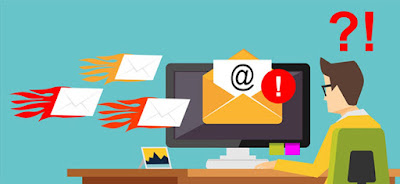WHAT IS EMAIL BOMBARDMENT?


The Internet security is an issue that should concern us much at all. It does not matter if you are a large company, an SME or an individual, on the Internet we are all exposed to risks, each day greater, risks from which we must protect ourselves.

How
to Improve Your Cybersecurity?
There are 4,000 million Internet users within the world,
although most of them are probably unaware of threats like ransomware, phishing
or cyberbullying, among others.
And if you don't know about a threat, how can you be
prepared to fight it? Here are some tips to improve your Internet security:
1. Keep both the operating system and your mobile apps
updated with software that gives you total
security from threats. This is essential to avoid new threats not
contemplated in previous versions.
2. Have a good filter against spam and never open spam.
Check spam with care and do not open attachments from unknown or suspicious
senders (sometimes hackers use names and emails of your contacts to write to
you, but by reading the mail carefully it is easy to detect oddities in the
language, the requests, the context). Banks will never ask you to vary your
password via email. Also be wary of exaggerated or unreal offers, they are
usually a fraud. Directly to the trash!
3. Install a security solution that gives you total
security from threats and scams. There are free and paid solutions to keep
your computer protected, which include a multitude of applications to protect
mail, Internet browsing, file downloads, against viruses and other threats. You
can check here those recommended by the Internet Security Office and choose the
ones that best suit you according to the use you make of the network: free
tools for your internet security.
4. Create a strong password. Don't look for a simple and
easy to remember one because it will be easy to hack. Better create a password
with muscle, that is, that contains numbers, lowercase, uppercase, some symbol
if the system allows it and at least 8 characters. Obviously, don't use the
same password on different sites either, because if the hacker compromises the
security of one of them, they could access the rest of your digital spaces with
the same password.
5. In Social Networks, to improve your security on the
Internet, the best thing is common sense. Think twice before sharing certain
personal information. Would something happen if a criminal accesses that
information? If the answer is yes, don't share it.
What do you think? Did you already know these
recommendations or is it the first time you hear them? Be that as it may, we
hope that you put them into practice and that they will be useful to improve
your security on the Internet.
Comments
Post a Comment